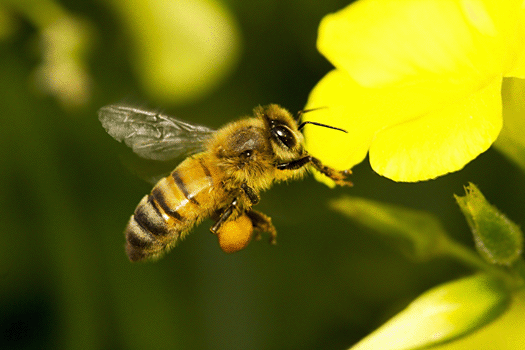Obama Administration Acts to Help Bees
June 24, 2014
The creation of a new task force charged with tackling the dire problems plaguing honey bees and other animal pollinators has been announced by the White House. Without these pollinators, commercial farming would be next to impossible. In the United States alone, pollinators help farmers produce $24 billion worth of crops annually. Among these are almonds, apples, cherries, kiwi fruit, melons, peaches, pears, raspberries, soybeans, and strawberries. Honey bees are the most important of animal pollinators. But since the mid-1900′s, the number of managed honey bee colonies in the United States has fallen sharply, from 6 million beehives in 1947 to 2.5 million today, according to Obama administration. “Given the breadth, severity, and persistence of pollinator losses, it is critical to expand Federal efforts and take new steps to reverse pollinator losses and help restore populations to healthy levels,” President Barack Obama wrote in a presidential memorandum.
Animal pollinators are essential because many plants cannot self-pollinate and so require pollen from another plant of the same species. In most grasses and many trees, wind transports the pollen. But in most flowering plants, animals, especially bees, do this. Most flowers reward the pollinating animal with nectar. Around the world, animal pollinators, including bumble bees, bats, birds, and butterflies, enable the production of 87 of the 115 leading food crops. That’s 35 percent of food production worldwide. But honey bee populations throughout the world faced a number of threats, including inadequate diets, infestations with mites and diseases, loss of habitat, lack of genetic diversity, and pesticides used in agriculture. Among the worst problems is a mysterious condition known as colony collapse disorder (CCD), which devastates bee colonies. Since 2006, honey bee colonies have been failing at the rate of 30 percent each winter, significantly higher than the 10-to-15-percent historical rate.

A honey bee worker hovers over a flower, sucking up nectar with its tongue. These bees also gather pollen, which they carry in areas called baskets on their hind legs. (© Shutterstock)
The new task force established by President Obama is to be co-chaired by the Department of Agriculture and the Environmental Protection Agency. Members of the group are to establish a coordinated plan to help the United States understand, prevent, and recover from pollinator losses. Steps are to include boosting research into pollinator threats and expanding the acreage and quality of pollinator habitat and food. “Pollinators contribute substantially to the economy of the United States and are vital to keeping fruits, nuts, and vegetables in our diets,” the presidential memorandum stated. “Over the past few decades, there has been a significant loss of pollinators … from the environment. The problem … poses a significant challenge that needs to be addressed to ensure the sustainability of our food production systems, avoid additional economic impacts on the agricultural sector, and protect the health of the environment.”
Additional World Book articles:
- Biology (2007) (a Back in Time article)
- Frisch, Karl von
- The Latest Buzz About Honey Bees (a special report)
Additional resources:


